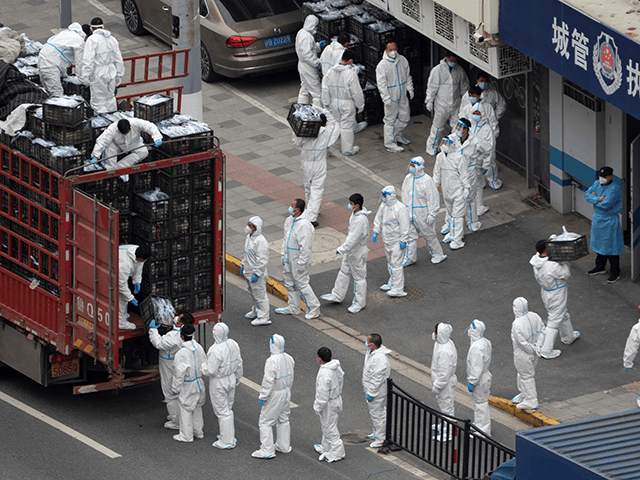The Chinese technology company Xiaomi announced the delivery of its first made-in-Vietnam phone handsets this week, the South China Morning Post revealed on Thursday, the latest Chinese company to move manufacturing power out of its home country in light of the Communist Party’s seemingly endless Chinese coronavirus lockdowns.
Reporting on Xiaomi’s partial divorce from Chinese supply chains, China’s state-run Global Times noted that several other Chinese companies like appliance maker TCL have also sought to escape the coronavirus lockdown chaos at home by moving manufacturing into neighboring Vietnam. Even prior to the pandemic, however, companies like Huawei, China’s largest telecommunications company, have sought more business in Vietnam as a safeguard against the arbitrary behavior of the Chinese Communist Party.
The trend of extracting supply chains out of China may soon escalate as Beijing has implemented several new Chinese coronavirus house arrest provisions this week in Shanghai, Macau, and Xi’an. Beijing itself, which avoided a total lockdown in the first half of the year despite early signs that dictator Xi Jinping would impose one, announced the nation’s first-ever vaccine mandate set to begin on July 11.
Xi has personally insisted in remarks published by the regime that the government neither abandon lockdown policies nor question them in any way.
China placed all 17 million residents in one of its biggest cities under lockdown on Sunday, as virus cases doubled nationwide. https://t.co/vyFOBbatZJ
— Breitbart News (@BreitbartNews) March 13, 2022
Chinese state media quoted a Communist Party official in late June stating that the regime intended to keep imposing widespread lockdowns for at least five years. The remarks prompted such outrage within China that the publication in question, Beijing Daily, deleted the comment.
“Countries like China that mismanage [Chinese coronavirus] will suffer greatly,” Jayant Menon, a visiting senior fellow with the ISEAS-Yusof Ishak Institute’s Regional Economic Studies Program in Singapore, told Voice of America this week. “That’s because their zero COVID approach has been very disruptive to supply chains.”
The South China Morning Post attributed Xiaomi’s embrace of Vietnam, a fellow communist country that has not continued to implement 2020-style lockdowns, for its manufacturing to a desire “to solve supply chain disruptions caused by [Chinese coronavirus], according to a report in the Vietnam Express which cited a local Xiaomi reseller.”
The newspaper, based in Hong Kong, also reproduced a statement from Xiaomi itself blaming the lockdowns directly for the move.
“Xiaomi’s shipment costs to Southeast Asia have increased due to [Chinese coronavirus] and escalating logistics costs, so having local production in Vietnam can help control costs,” the statement read in part.
The company nonetheless appeared to attempt to cover for the Communist Party’s economic failings: “For now, no overseas country can replace China’s supply chain system, and this is the consensus for the whole industry.”
Chinese Communist Party media confirmed on Tuesday that local officials in Guangxi, southern China, organized a public shaming session to parade four men in front of the public who had allegedly violated Chinese coronavirus lockdown protocols. https://t.co/xujRmnW5RI
— Breitbart News (@BreitbartNews) December 29, 2021
The Morning Post noted, however, that Xiaomi began extricating its manufacturing capacity out of its home country over a year ago, citing its Vietnamese partner, DBG holdings, which confirmed the timeline to the newspaper to the newspaper.
The Global Times also attempted to defend Xiaomi’s partial China exit in an article published on Tuesday that blamed the move on Southeast Asia having prohibitive delivery costs in its countries, requiring more local manufacturing.
“Alongside China’s industrial upgrading, some labor-intensive industries have started to relocate to Vietnam and other countries, starting with manufacturers of shoes, clothes and furniture,” the Global Times observed, claiming that this “is actually a sign of ‘healthy’ development – not a mass exodus prompted by chaotic communist mismanagement.
The Times listed “China’s leading household appliance producer TCL and display screen maker BOE” as among the Chinese companies leaving China, as well as a top solar panel manufacturer, Trina Solar.
Solar panel manufacturing in China faces not only the challenge of managing the effects of arbitrary coronavirus lockdowns but growing international concerns regarding slave labor. China is currently engaging in a genocide in occupied East Turkistan, its westernmost region, against Muslim-majority ethnic groups to the area, primarily the Uyghur people.

Grand Lisboa Hotel is under lockdown after COVID-19 cases were found there on July 6, 2022 in Macao, China. (Photo by Guo Kai/VCG via Getty Images)
Extensive reporting indicates that the Communist Party is forcing a significant percentage of the estimated three million people forced into concentration camps in East Turkistan to engage in slave labor, including manufacturing solar panels. U.S. Customs and Border Protection (CBP) has banned importing solar panels from some companies in the region on the grounds that they were likely manufactured by slaves.
A similar trend away from slave labor has resulted in companies in textiles leaving China, especially some avoiding the use of cotton from East Turkistan, which extensive evidence indicates is largely picked by Uyghur slaves.
Chinese companies moving supply chains out of China – while many in the West argue that it is impossible for foreign companies to do so – is a “decade-long shift,” the Asia Times asserted in a report this week, describing the coronavirus lockdowns as “accelerating” a trend already on the march.
“In recent years, Chinese smartphone makers Huawei, Oppo and Xiaomi have expanded their production in Vietnam, which has the advantage of proximity to China’s southern Guangdong province,” Asia Times noted. It cited a Chinese professor blaming not the lockdowns but “the strategic competition with the U.S.” as “the biggest force” making companies reconsider manufacturing in the communist country.
Follow Frances Martel on Facebook and Twitter.

COMMENTS
Please let us know if you're having issues with commenting.